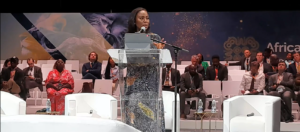Nigeria is set to sign Final Investment Decisions (FID) for two deepwater exploration projects by mid-2025.
This announcement was made by Olu Verheijen, the Special Adviser on Energy to President Bola Tinubu, during her address at the African Energy Week in Cape Town, South Africa.
While speaking at the conference themed; “The Future of Energy: Shaping the Workforce of Tomorrow”, Verheijen said Nigeria so far, has been able to unlock over $1 billion in investments across the value chain, and by the middle of 2025, FIDs on two more projects will be signed, including a multibillion billion-dollar deepwater exploration project.
According to her, the projects will be “the first of its kind in Nigeria in over a decade – one of many to come”.
“We see the abundant opportunities that lie ahead. We see a Nigeria that is a leading global producer and exporter of energy – whether it is fossil fuels or renewables.
“We are not held back by the outdated approaches and assumptions of the past. We are open, daring, and eager to leave a legacy that will stand the test of time,” she added.

She outlined some of what her team at the presidency has been able to achieve within the last 12 months including; clarifying the regulatory roles to create an enabling environment for investments, introducing reforms targeted at reducing high operational costs and project execution timelines, and introducing a clear set of fiscal incentives for Non-Associated Gas and Deep offshore Oil & Gas gas exploration and production.
She also said her team is working on building the foundation with an unprecedented sense of urgency, to completely rewrite the narrative of oil and gas investment in Nigeria, since the passing of the Petroleum Industry Act into law in 2021 after twenty years.
According to her, the way to shape tomorrow’s African energy workforce is to look beyond the traditional places and welcome a new crop of talent, especially women and young people who possess a global perspective, reach and understand the context of the 21st century, and are equipped with the fresh perspectives, bold energy to design and implement radical new solutions to lingering problems.
“As Africans, we are at a point in our developmental process where energy access is critical in shaping the continent’s future. Our resources (including renewables) are abundant, yet over 75% of the population lack sufficient energy access. As a continent seeking to change this narrative, we must ensure that energy ceases to be the limiting factor in Africa but rather becomes a tool for driving industrialization and development. One of the ways we can address this is through a productive energy workforce.
“There is no doubt that the future we are moving into will be very different from where we are coming and what we are used to.It will take incredible amounts of human energy and a diversity of talent and expertise to enable us adapt to these rapidly evolving and often unpredictable scenarios and circumstances. In summary: we are the ones who will determine the outcome of the delicate balance between energy security, affordability and sustainability for this continent,” she said.



